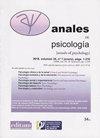Future expectations of adolescents from different social backgrounds
IF 1.3
4区 心理学
Q3 PSYCHOLOGY
引用次数: 0
Abstract
This paper analyzes adolescents’ future expectations (FE) and their relationship with personal variables (age, sex, self-esteem, and life satisfaction) and contextual variables (perceived social support and level of risk). The sample includes 748 adolescents, aged 9-16 (M = 11.93, SD = 1.42), coming from contexts with different levels of social risk. The results show that FE decrease as age increases, with few differences found based on sex. More positive self-perceptions and perceived social support are associated with better FE. Concerning the level of risk, more vulnerable contexts have a higher negative effect on FE. The regression analysis reveals the predictive capacity of the studied variables. The structural equation model confirms the positive causal effect of psychological adjustment and perceived social support, as well as the negative influence of contexts with greater social disadvantages on adolescent FE. The results suggest the need to establish preventive programs aimed at promoting personal resources of children, especially those who come from vulnerable contexts. Este trabajo analiza las expectativas futuras durante la adolescencia y su relación con variables personales (edad, sexo, autoestima y satisfacción vital) y contextuales (apoyo social percibido y nivel de riesgo). La muestra está formada por 748 adolescentes, con edades comprendidas entre los 9 y 16 años (M = 11.93, SD = 1.42) procedentes de contextos con distinto nivel de riesgo social. Los resultados muestran que las expectativas futuras disminuyen a medida que aumenta la edad, con pocas diferencias encontradas en función del sexo. Autopercepciones y sentimientos de apoyo social más positivos se asocian a mejores expectativas futuras. En relación al nivel de riesgo, contextos más vulnerables tienen un efecto negativo en las expectativas futuras. Los análisis de regresión muestran la capacidad predictiva de las variables estudiadas. Finalmente, el modelo de ecuaciones estructurales confirma el efecto causal positivo del ajuste psicológico y del apoyo social percibido, así como la influencia negativa de los contextos con mayores desventajas sociales, sobre las expectativas de futuro. Los resultados encontrados proponen la necesidad de instaurar programas preventivos orientados a fomentar los recursos personales de los niños, especialmente en aquellos que pertenecen a contextos vulnerables.不同社会背景的青少年对未来的期望
本文分析了青少年的未来期望及其与个人变量(年龄、性别、自我感觉和生活满意度)和背景变量(感知的社会支持和风险水平)的关系。样本包括748名9-16岁的青少年(M=11.93,SD=1.42),来自不同社会风险水平的背景。结果表明,FE随着年龄的增长而下降,基于性别的差异很少。更积极的自我感知和感知到的社会支持与更好的信仰有关。关于风险水平,更脆弱的环境对信仰的负面影响更大。回归分析揭示了所研究变量的预测能力。结构方程模型证实了心理调整和感知社会支持的积极因果关系,以及社会弱势群体对青少年信仰的负面影响。结果表明,有必要制定预防方案,旨在促进儿童,特别是来自弱势群体的儿童的个人资源。本文分析了青春期的未来期望及其与个人变量(年龄、性别、自尊和生活满意度)和背景变量(感知社会支持和风险水平)的关系。该样本由来自不同社会风险水平背景的748名9至16岁青少年(M=11.93,SD=1.42)组成。结果表明,未来的期望随着年龄的增长而下降,性别差异很小。自我认知和更积极的社会支持感与更好的未来期望有关。在风险水平方面,更脆弱的环境对未来的预期产生了负面影响。回归分析表明了所研究变量的预测能力。最后,结构方程模型证实了心理调整和感知社会支持的积极因果关系,以及社会劣势最大的背景对未来期望的负面影响。发现的结果表明,有必要制定预防方案,以促进儿童的个人资源,特别是在属于弱势群体的儿童中。
本文章由计算机程序翻译,如有差异,请以英文原文为准。
求助全文
约1分钟内获得全文
求助全文
来源期刊

Anales De Psicologia
医学-心理学
CiteScore
3.30
自引率
5.90%
发文量
57
审稿时长
4-8 weeks
期刊介绍:
Anales de Psicologia / Annals of Psychology is a multidisciplinary journal of the various thematic areas of scientific psychology. It publishes original research articles and theoretical review in any of its basic, applied and methodological areas included within psychology.
Publishing, financing, marketing and distribution corresponds Editum: Editions of the University of Murcia (Spain). The organizational guidelines and editorial policies come from the Editorial Team (elected for four years by the Areas and / or Departments of Psychology at the University of Murcia) and the Editorial Board, composed of scholars and experts from different universities and institutions national and international. It is published in print (ISSN: 0212-9728) since 1984 and in Internet publishing (web) (ISSN: 1695-2294) since 2000. Available online full text in pdf from the vol. 1 1984.
Anales de Psicologia / Annals of Psychology maintains a system of exchange with other journals and publications of psychology in the world. Through an free exchange agreement with their respective publishers or entities responsible for editing, these journals and publications are received at the University of Murcia (Biblioteca "Luis Vives", near the Faculty of Psychology) and in return, our journal is sent to libraries and educational and research institutions such centers responsible for editing.
 求助内容:
求助内容: 应助结果提醒方式:
应助结果提醒方式:


